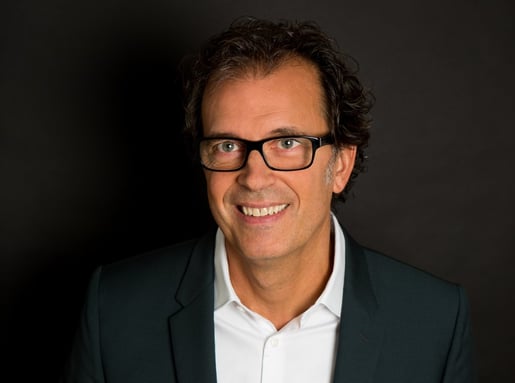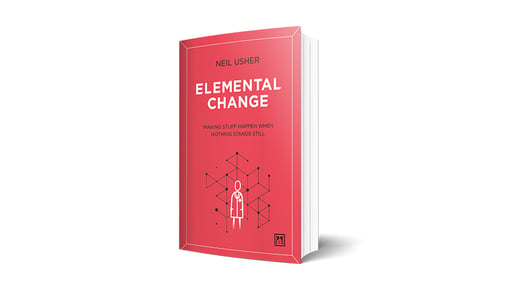|
Remember 2018? A time when industry events were commonplace, and the phrase “social distancing” wasn’t mentioned? Well, back in December 2018 we closed out the year with one final “Creatif Talks” seminar as we welcomed Neil Usher following the release of his critically-acclaimed book, “The Elemental Workplace”. Ahead of the release of his new book “Elemental Change”, we recently caught up with Neil for a chat about workspace, writing and of course the current pandemic. Creatif: Let’s start with the topic of the moment; lockdown. How have you found it personally? Neil Usher: I’ve worked at various times in my career and so the lockdown hasn’t been difficult, but home schooling has meant it’s not the experience I recall. That said, it’s been fantastic for connecting with my children, having lunch together every day, actually having conversations rather than driving a crazy school and activity schedule. I’ve always hated commuting so not having to get on the tube has been wonderful. I’ve kept in touch with many more people than I used to, and hardly been late to anything. Plus, my running has come on a treat.
Creatif: And how are you finding the transition to permanent remote working? NU: I’m remaining at home for the foreseeable future, I’ve no intention of sitting in a room full of perspex screens and black and yellow tape to do what I can do at home. I think this will be the case for the great majority of people, as anxiety levels remain high. The digital workplace has for many been a revelation and dissolved a great deal of the pre-pandemic prejudice surrounding remote working. While there are downsides, there are no more than those associated with the physical workplace. We’ve come to realise just how inefficient habitual office attendance and synchronous working actually are. It’s about the balance between the two. Creatif: The last time we caught up was back in 2018 following the release of your book, “The Elemental Workplace”. One of the elements you discuss is “inclusion” with regards to the need for employees to have input in the creation of a workplace – a theme echoed throughout the book. Have you noticed this is something that is more widely recognised in 2020? NU: I think inclusion as in everyone should have a fantastic workplace however they are or choose to be – certainly. Some great work has been done by several firms recently on neurodiversity, which is really encouraging, and goes beyond that which is evident and obvious. In terms of treating occupants as co-creators of space – as it evolves over time – much less so. This is a fundamental consideration within the idea of ‘perpetual beta’. Yet I think post-pandemic we’ll see a much stronger occupant voice. Now that wellbeing has moved from fine tuning to fundamental, we’ll be far more forthcoming in expressing what works and what doesn’t and will expect to be heard. Creatif: “Connectivity” is another element referred to in the book – something that many people and organisations have had to improve very quickly due to such a sudden increase in remote working over the last few months. What are some of the other key challenges still ahead in the return to work? NU: Probably the biggest is the shift from synchronous to asynchronous work. Everyone working at the same time in the same space has been with us as an operating principle since the industrial revolution when the tools of our trade were of such a scale there was no alternative. |
The key shift in mindset and practice will be from seeing the digital workplace as doing online what we used to do in the office, in the same way, at the same time, to, an entirely new way of working. Those organisations we once believed were eccentric or outliers have much to teach us in this regard. The opportunities for significantly increased collaboration and innovation are almost scary. For this reason, most organisations haven’t left base camp yet. Creatif: Retrospectively, is there anything essential you have learned following the book’s release? NU: It’s become apparent that there are more dimensions to each of the elements than I initially realised. I’ve got to explore each in more depth, to be challenged on aspects of them. Take Comfort for instance – its psychological and emotional aspects are now just as important as the physical, possibly even more so. Attending to one aspect could well negatively affect one or both of the others. I think if I were starting again, or updating the book, there would be a lot more depth to the exploration of each of the elements. Creatif: Your new book “Elemental Change” is out in September. One released quote seems particularly relevant given the current situation; “Amid the chaos of intended and unintended consequences we're expected to lead a change initiative. We have to learn fast, as its already started.” – could you expand on that a little? NU: Most books about change seem to assume that the world is standing still, or can be stopped for us, or we’ve somehow de-coupled our initiative from reality and taken it into the lab to work on it. As a practitioner rather than an observer I’ve had to battle for decades with the ever-moving pieces, like trying to do a 4D jigsaw while lots of other people are trying to do it too. Also, change initiatives have often started before we realise, they are the tail ends of other projects, threads of thinking or work already underway that we begin to knit together. We add the bookends for convenience, to help us and others make sense of it. All beginnings and endings are messy. But the middle is especially messy.
Creatif: Who is “Elemental Change” for, and why should they read it? NU: It’s for everyone who is leading – or thinks they may be asked to lead – change. It’s not a workplace book, although it’s just as applicable to workplace change as any other area of activity. I’ve tried to write a book about this elusive discipline that’s human, entertaining and accessible. A book on the subject shouldn’t terrify you or overwhelm you, but make you feel you can do it. In using the elemental framework, it makes it easy to follow and is intended to apply to any sector, any location and any level of complexity. And hopefully stand the test of time. Creatif: It’s good to see the pandemic doesn’t seem to have slowed down the book’s release. What sort of plans to you have for the launch? NU: It’s all drafted, edited and complete, I’m just queueing for design! Publication went back a couple of months but is still scheduled for 2020 – so all things considered I think the timing is good. What an ideal Christmas present. I’m seriously hoping to be able to do an in-person launch in November – and the Creatif showroom would be an ideal spot. Book launches just aren’t the same online, it’s such an ‘analogue’ experience. Watch this space. » More about Neil Usher
|

